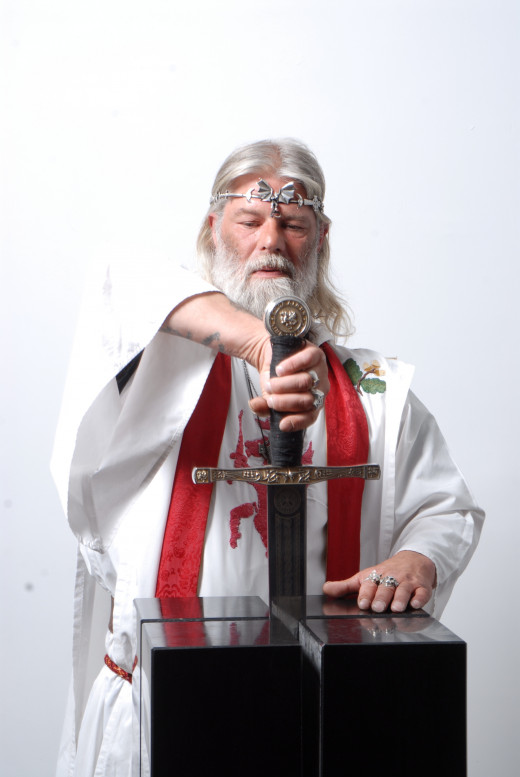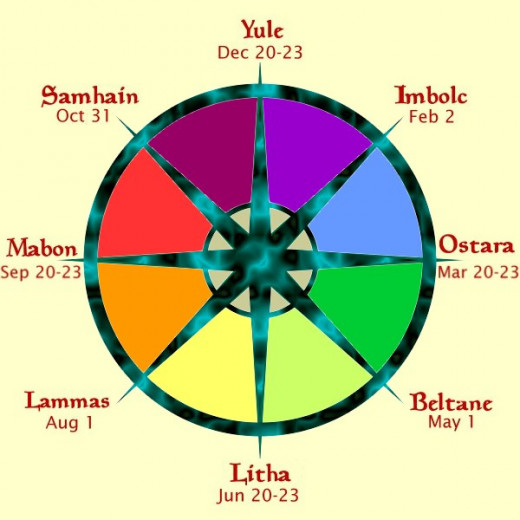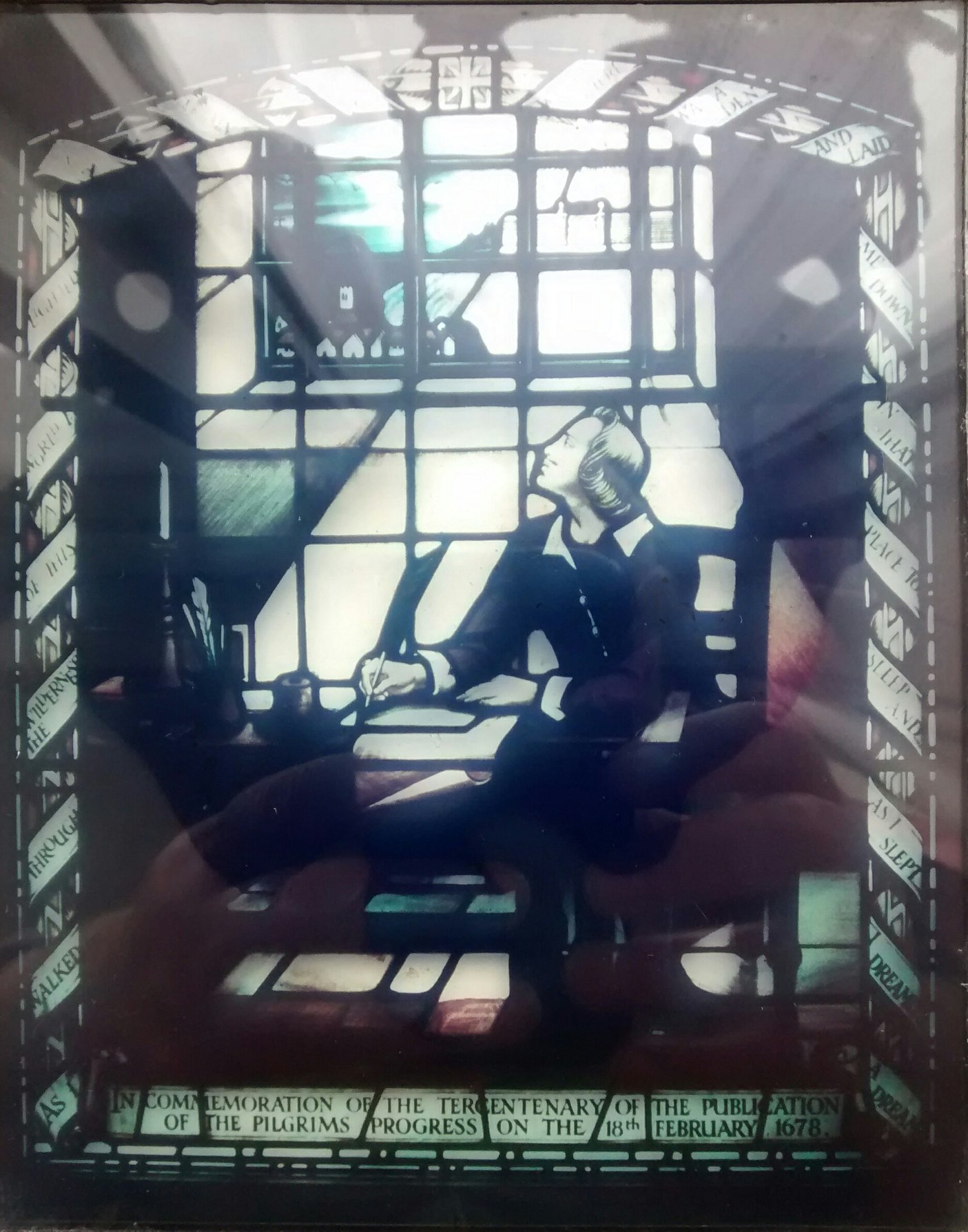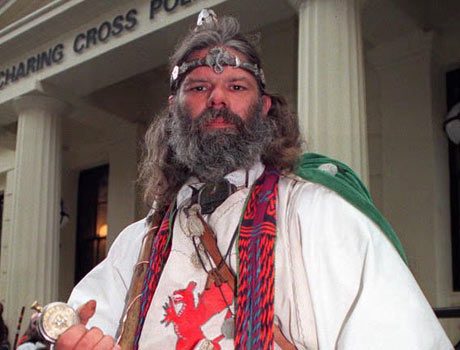Mog Ur Kreb Dragonrider
When I first started work on The Trials of Arthur, people thought that I was crazy. If I told them about King Arthur they would say, “so where are you meeting him then, in a mental institution?” It became a hard thing to justify. I’d been moderately successful in my writing career up till then, with columns in the Guardian and the Big Issue amongst others. I’d had two books published. After I started work on what I’ve always referred to as “the Arthur book” my career went into terminal decline. I’m not saying that co-writing a book with a biker who says he’s King Arthur caused that to happen. Maybe it was going to happen anyway. But it was certainly a staging post on my journey to oblivion, a mile-stone on the lonely road to nowhere in my writing career, and very prominent in my memory for that reason.
My first conception of the book was that it would be about protest. I wanted to use the figure of Arthur as the central thread around which I would weave a story about protest and rebellion. There was a lot of it about in the 90s and Arthur had been heavily involved in much of it. But by the time of writing those protests were long gone. Consequently I had to find us some new protests to get involved with.
Thus it was that our first trip was up to Scotland to join in with a protest at the Faslane Naval base on the Clyde, where Britain’s nuclear deterrent is kept.
There were several things about this journey which made it memorable, although none of it went into the book. Firstly that I missed the turnoff for the Motorway, which didn’t bode well. I was losing my way already and we hadn’t even started yet. Then that we picked up Mog Ur Kreb Dragonrider on the way – generally known as Kreb – who was due in court in Scotland on some charges relating to the peace protest. Kreb is as memorable for his personality as he is for his name, being one of Arthur’s staunchest supporters, and a truly unique individual.
We stopped at a Motorway service station on the way to get some breakfast. Arthur and I both had full English breakfasts with bacon and sausages and all the trimmings. Kreb is a vegetarian but opted for the full English too. I can’t remember his exact words now, nor his reasoning. What I remember was his tone, a kind of careful, weighed out deliberateness in the way he spoke, a measured seriousness, accepting the food with a kind of bow, because it was a gift, because he honoured it, and because he wanted to partake fully of the experience as a member of the clan.
A glossy beard
After a while Arthur took over the driving and our speed increased. We were doing up to 120 mph, tagged on behind another vehicle which Arthur was using as a marker, hanging on to its tail, swerving in and out of the traffic with furious precision, weaving a fine line between destiny and danger. Arthur was driving casually with one hand holding the steering wheel, a look of calm concentration on his face. I was most impressed with his driving and always felt like he was in complete control. Until we got to the other end, that is, after we’d dropped Kreb off in Glasgow and were making our way to my friend’s house in the fading light of evening, and he almost drove directly into a roundabout, missing the turning completely, and I suddenly realised that he couldn’t see anything, that he needed glasses, and I took over the driving.
My friend, Alan, had moved in with a woman with a couple of kids. The kids were most impressed with Arthur, especially his sword. Later on we were starting to get very drunk. Arthur wanted food. He was looking for something to eat and came across some dog biscuits in the kitchen, which he began to eat with relish, to everyone’s amusement. He ate at least eight of them. My friend said, “that’s why he has such a cold nose and a glossy beard.”
The following day we drove over to the Faslane protest site and Arthur almost immediately got himself arrested. He was wearing his robes. I overheard someone talking about the arrest. “What’s that for,” he said, “bad dress sense?” He was arrested along with a Labour MP, a Member of the Scottish Parliament, Catholic Priests, Church of Scotland Ministers and members of the Scottish Nationalist Party. I spent the rest of the day waiting for the phone call to say that he needed picking up. It didn’t arrive till late in the evening by which time I had already started to drink.
The following day we went to pick him up from the Friend’s Meeting House in Glasgow, which is where he’d been dumped after his arrest. He was standing on the step outside smoking a cigarette. It looked like he had been standing there all night. Later on we went to find Kreb at the peace camp and then went for a walk. There was an old empty Manor House nearby, which looked like a Pre-Raphaelite castle, and Arthur was talking about squatting it. It seemed like a great place for an Arthurian squat. We were in the garden and there was this old tree with a bough that stooped down low to the ground. Me and Alan both tried climbing it, but neither of us could manage. Alan found this stick and was practicing his swordplay, holding it over his head, making out like he was a Samurai warrior. And then we turned around and there was Arthur perched in the tree, lying on his side like a reclining Buddha, looking like some kind of a tree elf with a look of impish mischief on his face. It was so quick and unexpected it felt like he must have levitated himself to get there.
After that we bought some cider and Arthur was immediately drunk. He only had to open the bottle and smell the contents. We got back to Alan’s place and one of the locals called in, a very broad and muscular lesbian. “Nice tits,” Arthur commented while sucking on his cider bottle. That’s one of his chat-up lines.
“Arthur!” Alan shouted in amused outrage, “she’s a lesbian.”
“I don’t care,” Arthur said, “she’s still got nice tits.”
And that was the end of our first attempt to get material for our book.
A bin
The plan was that I was going to follow him around for a year, and work that into a narrative with his past life as a series of flashbacks, but it became quickly apparent that driving him about in hired cars and paying for everything would soon eat up the advance money. I decided to use the story of my original search to find him instead, but we had a new difficulty now. It was joint authorship. Who’s voice was I going to use?
A month or so later we met again in Amesbury for one of the round-table meetings about access to Stonehenge. I had a return ticket on the train. After the meeting we went to the pub to discuss the book, and that’s where we decided on the ploy of writing in the plural: “we” instead of “I”, “our” instead of “my”.
We were soon quite drunk. I said, “I’ll have to get back Arthur, I’m going to miss the train.” I got out my tickets to show him.
“Trust me,” he said, “I’ll get you home,” and he snatched the tickets from me and ripped them up.
So, several hours and many pints later, after a bag of chips and a battered sausage from the chip-shop, we made our way up to the Countess roundabout on the A303 in order to hitch home. After about five minutes Arthur slumped to the floor under his cloak and promptly fell asleep. It was early in the year, February, and very cold. I was marching up and down with the cold. No one was driving past. Those that did saw a crazed middle aged man alongside the body of a dead King. They probably thought it was regicide.
I was jumping up and down with the cold. I was walking about exploring, beating myself with my arms to stay warm. The service station was closed but the entrance lobby was open. I went in there and tried to sleep but couldn’t. The floor was rough and hard. Outside again I found what I supposed was the outlet for the refrigerator units inside. It was blowing out warm air. I stood under the air flow and tried not to die of exposure. This went on for several hours, but I was so tired, I really needed to lie down. The lobby was locked by now. Someone must have crept up without me seeing and turned the lock. Or maybe the lock was automatic, in which case it was a good job I wasn’t inside. There were some dumpster style bins nearby full of cardboard. So I climbed into one of these, pulled the cardboard around me and over me, and, though I didn’t sleep, was at least lying down and moderately warm.
The following day we caught a bus from Amesbury to London. So Arthur had kept his promise. He’d got me home all right…. by allowing me to pay for our tickets on the bus.
Glastonbury

Later that year Arthur came to visit me in my hometown, in Kent. The historical Arthur is a Celtic hero, of course, while Kent is the seat of the Saxons, the traditional enemy. While Arthur was staying with me I had this dream, about a small white dragon emerging from the waters of a river. It was a very vivid dream. The dragon was palpably real, snorting with a cold breath, about the size of a small horse, but stockier. Pure, albino white, the water running off its back shining in the sunlight. Afterwards I realised that this was the symbol of Kent, normally depicted as a white rampant horse, rather than a dragon.
This was in 2001. Everyone knows what happened in September of that year. I was getting seriously blocked with the book by now and could no longer see the point of it. Bigger things were happening. Who cared about some crazy biker and his pretensions to legendary status? The whole world was falling to bits.
I’d started to grow very depressed. I was drinking on my own and not writing. The book began to feel like a terrible burden I was carrying, a millstone around my neck. For once that’s a cliché that almost exactly describes the feeling: like a dead weight dragging me down. I couldn’t get any other work. No one was taking me seriously any more. I was telling everyone that I never, ever wanted to write another book. It was a vicious cycle. Whenever I thought about it a kind of stultifying heaviness descended on my mind and I couldn’t lift myself enough to write, but the failure to write was just increasing the weight.
I think now that I was approaching something near to a clinical depression. This wasn’t made any easier by the fact that people were scoffing very noisily at my project. I thought I was looking at the end of my writing career. But here’s a measure of all of that superfluous noise: one of the people who was snorting the loudest at the time later died of alcohol poisoning in the Philippines having sired a child with a teenage prostitute. So who, now, seems the craziest?
Meanwhile Arthur was growing increasingly restive about the lack of progress with the book and had asked a mutual friend to help. So I was invited to Glastonbury with the idea that I would be fed and watered while I got on with the writing. This was in the beginning of 2002.
I have to say this helped: not only having food cooked for me, and people to sit with in the evening, but someone to read the book to after I had finished my days’ writing. The book began to move again. In fact it started to get good. I was writing about the protest scene by now, and suddenly it all began to have relevance again. Yes, the world was turning apocalyptic before our very eyes. Yes, an almost literal hell was being unleashed upon the Earth by the forces of war and insanity. But memories of people’s defiance in the road-protest scene of the 90s seemed like an antidote to that. Something real. Something hopeful, with Arthur’s particular blend of egotism and heroism at the heart of it. People putting themselves on the line for beauty and nature and living up to an ideal.
The deadline had been put back several times by now, and, with most of the book finished, I quickly tossed out an introductory chapter and a conclusion knowing that I would be asked to rewrite them both once the editing got under way. They asked me to rewrite the conclusion but they never asked me to rewrite the introduction.
The Wheel of the Year

The book came out in 2003 to no great acclaim. My depression got worse, and I gave up writing altogether to become a postman. My one regret was that I hadn’t made a better job on what would probably turn out to be my last book. It had some good bits, but I always hated the introduction. It was slow and turgid, badly written and clumsy. So when Arthur asked me if I could get the book republished in 2009 I decided that I wanted to rewrite it first.
The Trials of Arthur Revised Edition is the fruits of my labour.
It is the book I always wanted to write.
Not only have I rewritten the first chapter, but I’ve added a number of other chapters too. The original book had seventeen chapters, while the new book has twenty four. It is around 20,000 words longer. Two of the chapters were written by Arthur, the rest by me. We’ve extended the quest element of the first part of the book, while adding a new theme. “The Turning of the Year” represents the pagan calendar as a cycle running through the book. It extends the idea of the quest but specifically attached to the time of year. Thus the first chapter is called “The Turning of the Year: Samhain” and is set on the Prescelly Mountains in Pembrokeshire,West Wales, on Halloween night in 1994.
I won’t tell you about all the new chapters. Suffice it to say that they do what the original first chapter entirely failed to do: they take you right into the action, and then keep you there.
Unlike the original, this is a book I am immensely proud of.
It is also, very definitely, not my last book.
Blurb
This is an updated version of an earlier book “The Trials of Arthur: The Life and Times of a Modern Day King.”
It is more than 20,000 words longer and has nine brand new chapters.
The Central character is a Druid, who is also a Biker.
He claims to be King Arthur, but is actually sane.
It is set in the UK in the mid nineties but it is still relevant today.
It is about someone who may never have existed, and about someone who definitely does exist. About Myth and about meaning. About history and how to make it.. About the world and how to change it. About standing up for what you believe.
It is the Matter of Britain brought up to date.
“So unbelievable it might just be true” Awen Clement, Kindred Spirit
“A haunting elegy to all those people who refuse to accept that they can not make a difference in a world they know must change ” Deborah Orr
Reviews on Goodreads: https://www.goodreads.com/book/show/2004656#CommunityReviews
Available here:
Donate
Like what you read? Please consider donating. As little as £1 would help. Details on my donations page here: https://whitstableviews.com/donate/


